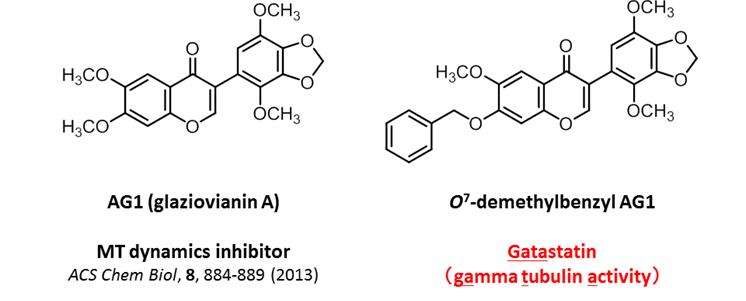Success in the development of a gamma-tubulin specific inhibitor

Microtubules, one component of a cell's skeleton, are hollow tubes formed from the polymerization of α- and β-tubulin, which are themselves important structural proteins of the mitotic spindle that equally separates chromosomes during cell division. As such, several α/β-tubulin inhibitory agents are used as therapeutic drugs against cancer cells, which are undergoing vigorous cell division. However, microtubules perform important work even outside of cell division, and normal cells not undergoing division can be harmed as well, so the side effects of such treatments have become problematic. A wide variety of research has shown that γ-tubulin activates during cell division and that it is overexpressed in a portion of cancer cells, so it holds potential as a target protein for new anticancer agents with few side effects. Despite this research, no specific inhibitors have thus far been discovered.
University of Tsukuba Faculty of Life and Environmental Sciences Associate Professor Takeo Usui and Researcher Takumi Chinen, and University of Tsukuba Faculty of Pure and Applied Sciences Professor Hideo Kigoshi, in joint research with Heidelberg University, Okayama University, Tokyo University of Pharmacy and Life Sciences, and RIKEN have synthesized and developed the α/β-tubulin inhibitors glaziovianin A and plinabulin, advancing the development of compounds that exhibit γ-tubulin inhibitory activity, and have succeeded in developing the γ-tubulin specific inhibitor gatastatin.
Furthermore, using gatastatin their research has shed light on the fact that γ-tubulin function is important in microtubule function in the late stages of cell division. The results of these studies provide knowledge linking to analyses of intracellular γ-tubulin function as well as the development of new anticancer agents.
More information: Takumi Chinen et al. The γ-tubulin-specific inhibitor gatastatin reveals temporal requirements of microtubule nucleation during the cell cycle, Nature Communications (2015). DOI: 10.1038/ncomms9722
Journal information: Nature Communications
Provided by University of Tsukuba



















